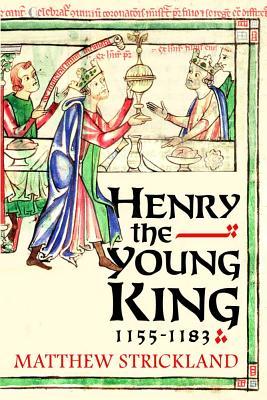MedievalReporter.com
Covering history's most marvelous millennium
Join our newsletter!

Covering history's most marvelous millennium
Covering history's most marvelous millennium
We review stuff for you, so you can pick the best medieval material.
Here’s our take on Matthew Strickland’s Henry the Young King.
Strickland’s book is a medieval biography of a unique character – Henry, “The King Who Never Was”. He was anointed and coronated according to all the rituals customary at the time, but the twist here was that his father Henry II, the “Old King”, was still alive and kicking. The Old King was, in fact, experimenting with associative monarchy: crowning his son and heir was he himself still ruled England, Normandy, Anjou, Aquitaine, and so on.

The problem here was that Henry II never gave his son any of these territories to rule, even after the coronation of the latter. The Young King was as confounded by this as his contemporaries and always remained the king without a kingdom. In the end, he never even got to rule because he did not survive his father.
Matthew Strickland beautifully captures the many highs and lows of young Henry’s life, from the splendor of his coronation and his successes at knightly tournaments to the permanent insecurities about whether his father actually wanted him to grant him any real authority. The Old King, Henry II, stressed his son’s royal status yet initially didn’t devolve even a single castle to him. The Young King talked and reasoned and negotiated with his father to the point of such frustration that he even took up arms against him, plunging England and much of France into civil war.
Henry the Young King thus gives an extremely interesting perspective into the Angevin monarchy, the name of the dynasty both Henries belonged to. The Young King is historiographically not only overshadowed by his father Henry II, but also by his brother Richard Lionheart and even his infamous other brother John Lackland. Strickland valiantly succeeds in bringing the Young King into the limelight. In fact, it probably gives more of an insight into the family nest that Richard and John came out of than the standard works on them themselves.
What then, are the book’s drawbacks? In short, it’s exceedingly detailed. While Strickland captures the intrigues at the comital or episcopal layer of the Angevin realm like you’re reading a 12th-century newspaper, it’s hard to keep track of all the minor characters. The same goes for all the French place names, as the Angevin kings of England spent more time in France than in Great Britain. If you don’t know French geography that well, you might struggle with this aspect. On the other hand, if you like to read about medieval Anglo-French relations before the Hundred Years’ War, this book might just be the one.
Furthermore, the source material for this book is quite sparse at times. Matthew Strickland is fairly transparent about this, oftentimes stating that young Henry simply disappears from the historical record for months on end. But the author then goes on to fill the subsequent pages with how his family members were doing in the meantime; or how succession politics worked in contemporary France or the Holy Roman Empire (young Henry’s grandmother was nominally empress there); or what Thomas Becket’s career looked like at the time. While we, as medievalists, loved these background passages, you might come to dislike them as they’re not – in a strict sense – really dealing with the book’s literal subject: Henry, the Young King. Finally, as the book meanders frequently, this also means it could’ve been significantly shorter.
All in all, this is a great book on a fascinating king who never quite got where he wanted to be. The narrative of choice does have some downsides, though: don’t buy this title if you’re rather new to the subject of medieval England – or France, for that matter.

“Good (but hard for medieval newcomers)”
Disclosure: these are affiliate links, meaning – at no additional cost to you – we will earn a small compensation if you click through. With these earnings, we can provide you with more exclusive medieval reports and guides.
Grab another book review from our collection.